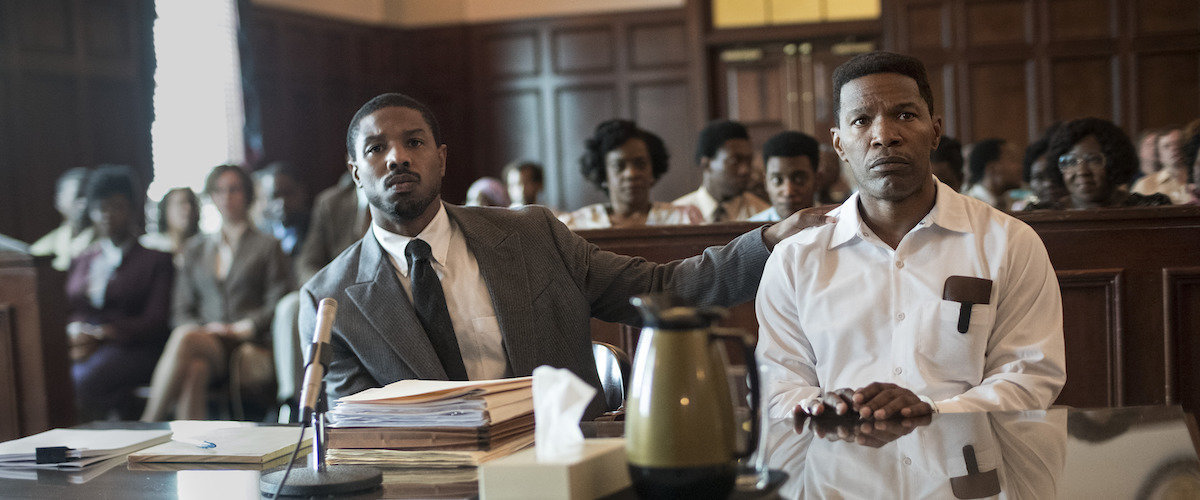The Burial
by George Wolf
Point of order: early on, The Burial understands your objections about many courtroom dramas.
“Sounds like a nap waitin’ to happen!”
Rest easy. Director/co-writer Maggie Betts and an electric ensemble take inspiration from a true “David v Goliath” court case, and give it a new shine that boasts humor, humanity, style, and a vital sense of history.
Back in the mid-1990s, Jeremiah O’Keefe’s (Tommy Lee Jones) small chain of Mississippi-based funeral homes was deep in debt. His longtime lawyer Mike Alred (Alan Ruck) brokered a partial buyout with Vancouver “death care” giant Loewen Corp, but as the months dragged on, rookie lawyer Hal Dockins (Mamoudou Athie, Black Box and Jurassic World Dominion) smelled something foul.
Ray Loewen (Bill Camp) was just waiting for O’Keefe’s small business to bleed out, until Jeremiah had no choice but to sell it all at a bargain basement price.
So, Mike files a lawsuit with hopes for an 8-million-dollar settlement, while Hal hatches a plan to get flamboyant Florida lawyer and parttime preacher Willie Gary (Jamie Foxx) to join the O’Keefe team. Gary hadn’t lost a personal injury case in years and had a private plane (“Wings of Justice!”), but he didn’t do contract law. Hal sells him on the case’s potential (Athie excels in this scene, completely selling us on the film’s pivot), and Gary comes on board, not only refusing to settle but upping the damage amount…to 100 million dollars.
“Boom! That’s what I’m talkin’ about!”
Gary views litigation as warfare (“Jean Clade Van Damme-like shit!” – legkick!), but Loewen has the formidable Mame Downes (a terrific Jurnee Smollett) on their side, and she’s a young legal phenom who’s earned the nickname “Python.”
Their smiley banter reminds you that the standard course here would be a secret romance outside the courtroom. But it is not lost on these two lawyers that they are African Americans representing old white men in the deep South, and the film is able mine this issue with grace and subtlety.
This is a perfect vehicle for the Oscar-winning Foxx, and his magnetic performance reaffirms the depth of his talent. The spot-on impressions and oversized characterizations aren’t hiding an ability to find nuance. Foxx makes sure we see the heart under Gary’s flashy exterior, and it’s hard to take your eyes off of him.
Jones, more tender than usual, is equally suited to play Jeremiah, a man committed to providing for his large family (13 kids, 24 grandchildren) after he is gone.
There isn’t a weak spot in the cast, as Betts (Novitiate) keeps things humming with a pace that’s rarely derailed by any legal minutiae. The opening statements alone, edited to become a rapid-fire debate between counsels, serve notice that there will be no time for napping.
And if a “cheer for the little guy” moral is all that The Burial offered, it would be a worthwhile crowd-pleaser. But there is more to that title than just a reference to the funeral business.
From the amusing meeting between an admittedly “little bit prejudiced” Mike and the all-Black legal team he must work with, to some hushed and stirring moments beside an old slave cemetery, Betts slyly addresses the question of why it always has to be about race.
Because it’s always about race, and power, and oppression, no matter who is trying to bury that piece of America’s past. It’s a lesson that’s part of our present, as well, and The Burial builds an entertaining bridge between a decades-old court case and a never-ending struggle.




